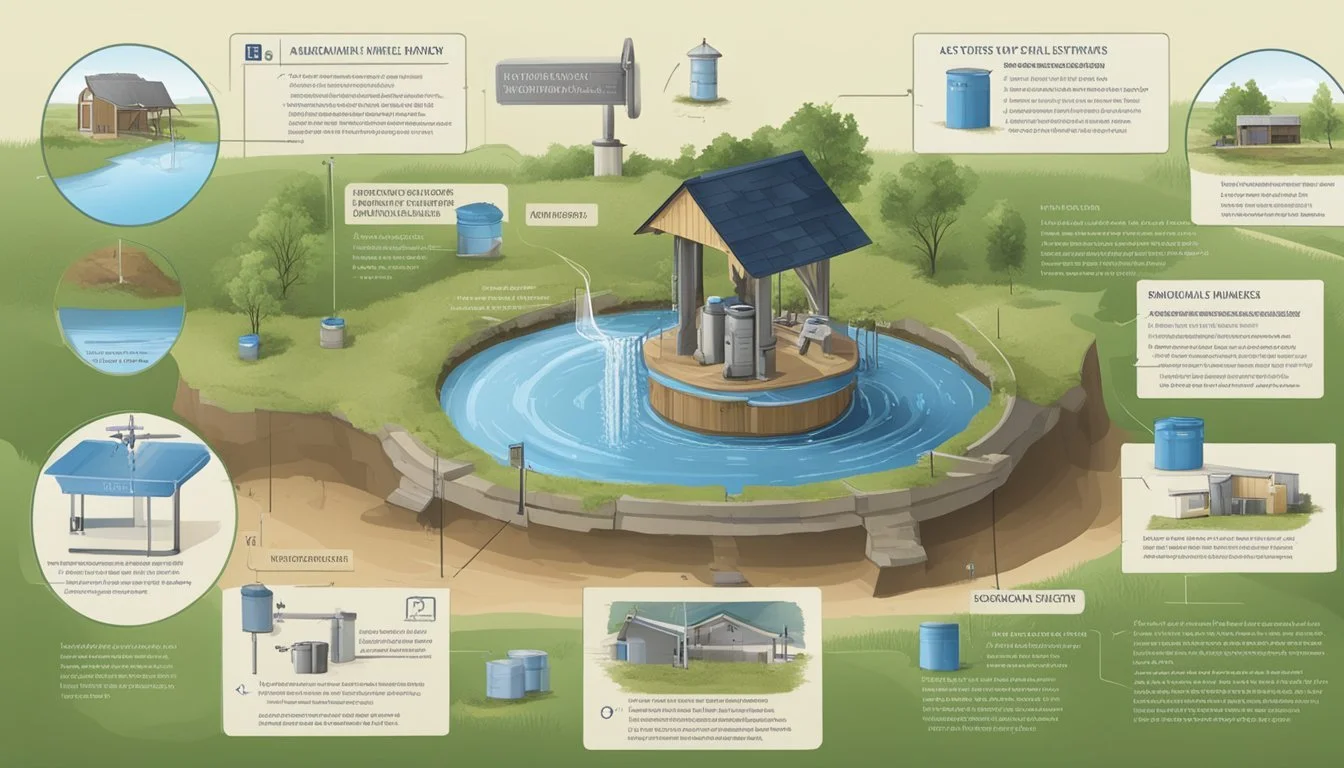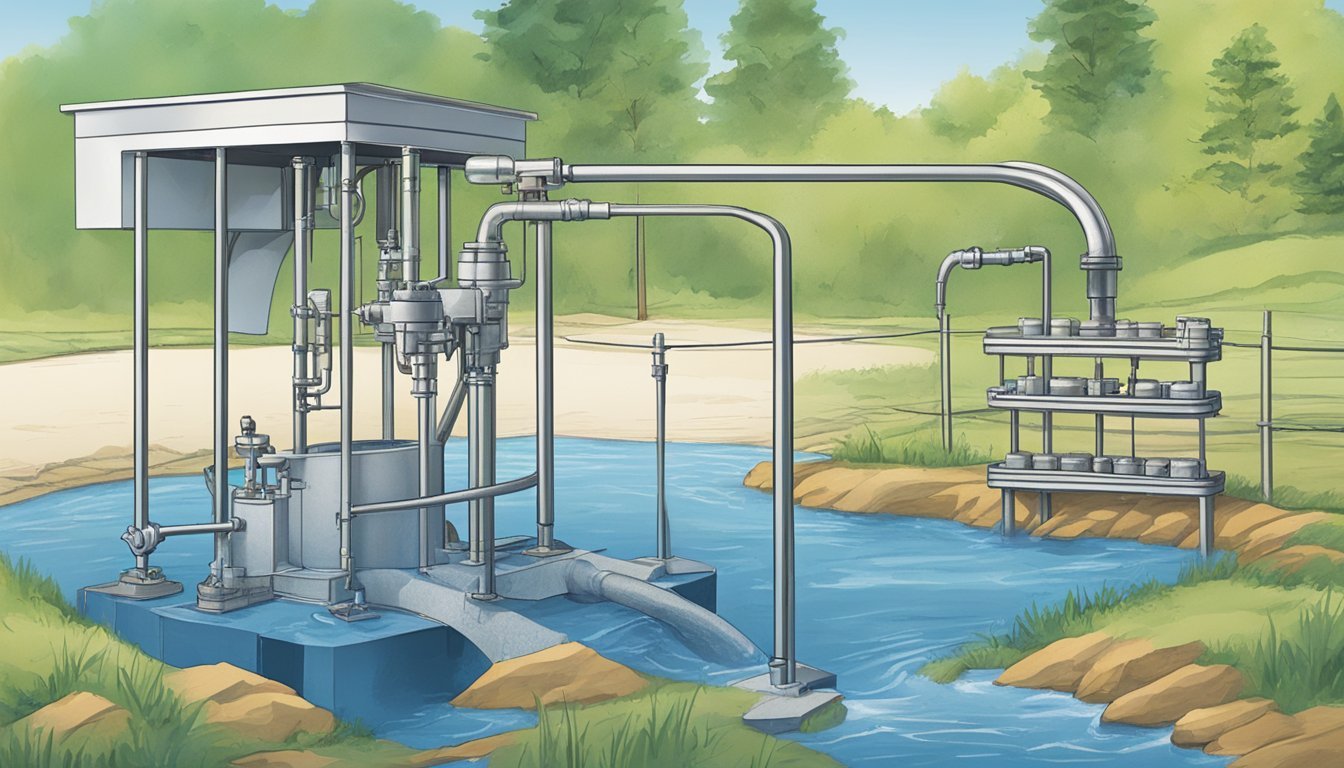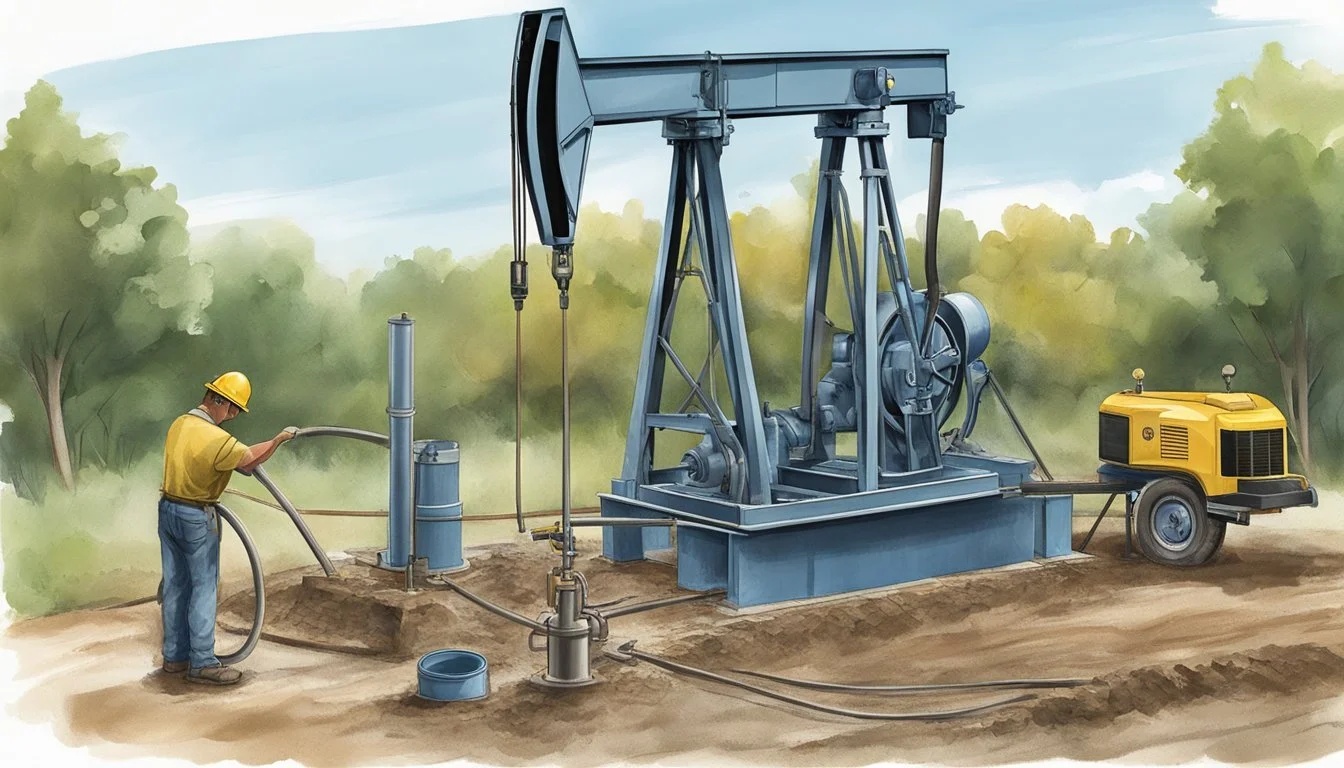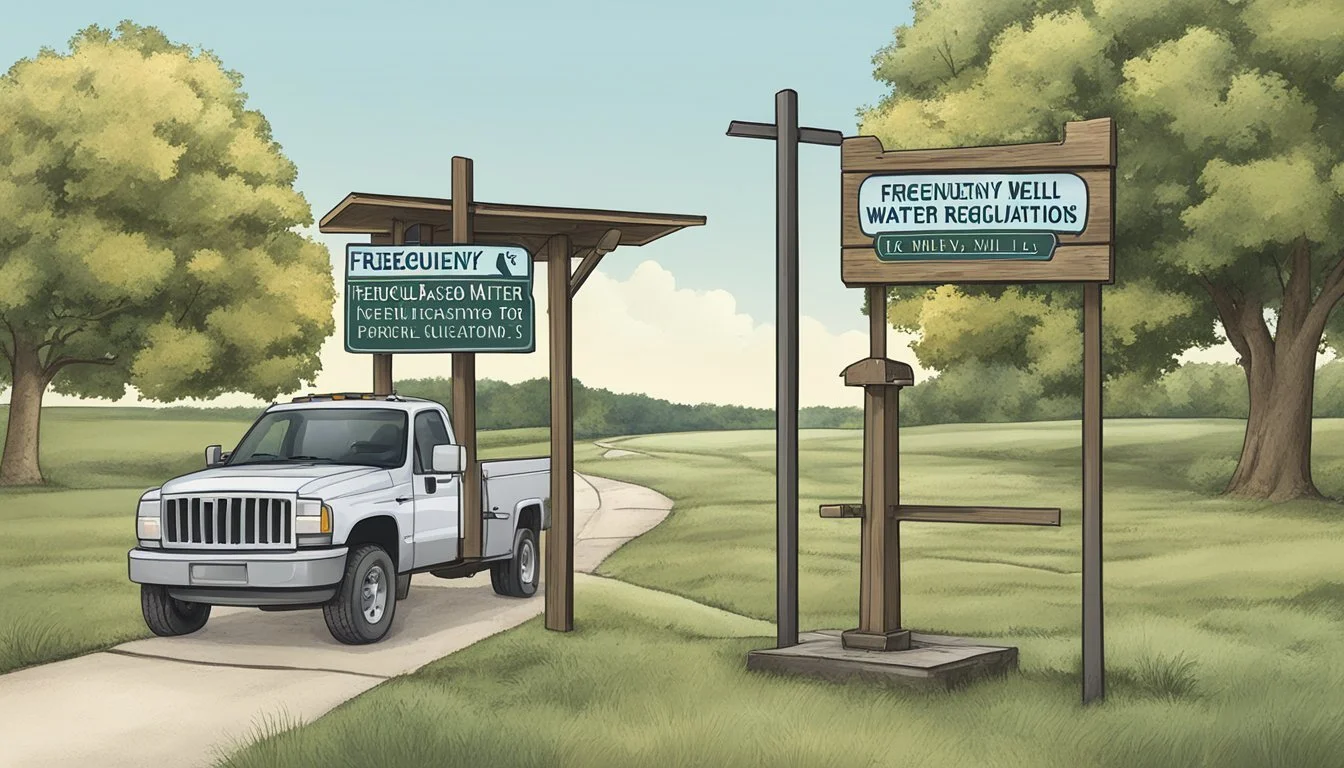Missouri Water Well Regulations
A Guide to Compliance and Safety Standards
Missouri's groundwater resources play a crucial role in the health and economic vitality of the state. Understanding and adhering to the Missouri Well Construction Rules is pivotal for ensuring that water wells within the state meet safety and quality standards. These regulations are in place to protect groundwater from contamination, which affects not just individual well owners but entire communities and ecosystems that rely on this precious resource.
Established under the Water Well Drillers Act, the regulations set forth standards that cover a range of elements from well location and design to construction and maintenance. Contractors and property owners looking to drill or maintain a well must seek appropriate permitting and adhere to the mandated standards. Compliance guarantees the protection of Missouri's groundwater and safeguards public health and safety.
With varying geological features across Missouri, the groundwater quality can differ significantly, which implies the necessity for regulations that can accommodate such diversity. Reports of contamination with bacteria like E. coli in private wells highlight the importance of regular well maintenance and water quality testing. The state's regulations ensure that well construction and maintenance practices are consistent, and public health concerns are promptly addressed.
Missouri Water Well Overview
In Missouri, the Department of Natural Resources (DNR) oversees water wells to ensure the protection of the state's groundwater resources. These regulations are crucial since water wells are a significant source of drinking water for nearly 3 million Missourians, as well as supporting irrigation and industrial applications.
Wells are classified based on their usage, including domestic, multiple family, non-community public water supply, community public water supply, and high yield wells. The Missouri Well Construction Rules lay out specific standards for the construction, maintenance, and decommissioning of wells to safeguard groundwater from contamination.
Permitting: Contractors must obtain permits and renew them periodically.
Well Records: Contractors are required to submit well records.
Well Types: Regulations are specific to the type of well and its intended use.
Protection and Maintenance: Standards are in place to protect the well and maintain water quality.
The Missouri DNR also provides a Citizens Guide to Water Rules and Regulations, helping the public understand the regulations and their role in protecting water wells and groundwater. This guide serves as a resource for industry professionals and citizens alike, detailing how the regulations serve the public interest.
For any well, location requirements and construction specifics, including surface drainage and positioning relative to potential contamination sources, are outlined by the Missouri Code of State Regulations, ensuring water wells are appropriately sited and built to minimize risks to groundwater quality.
Water Well Construction Regulations
Missouri's water well construction regulations are comprehensive, focusing on the protection of groundwater through detailed construction standards, including specific requirements for casing, liners, and the annular space.
Construction Standards
Construction standards for water wells in Missouri are designed to safeguard groundwater from contamination. They include criteria for well placement and integrity. For instance, the Missouri Well Construction Rules outline the necessary procedures to ensure that water wells are constructed in a manner that prevents pollutants from entering the water supply.
Casing Requirements
Casings are a critical component of water well construction, providing structural support and preventing contaminants from seeping into the water supply. In Missouri, water well casings must meet minimum standards, which are strictly enforced to maintain the integrity of the well and to protect groundwater. Steel well casing, for example, should comply with specified thickness and diameter standards.
Specifications for Steel Well Casing:
Minimum Wall Thickness: According to set guidelines
Diameter: Must adhere to standards based on well type and depth
Liner and Annular Space
Liners in water wells are utilized to provide a secondary barrier between the well and the geological formations, while the annular space, the gap between the casing and the drilled hole, should be properly sealed with a cement slurry to avoid infiltration of surface pollutants. The regulations dictate that the annular space be filled with an approved sealing material to avert the direct flow of water between different strata.
Annular Space Sealing:
Material: Cement slurry or other approved materials
Purpose: To prevent contamination between different layers of the substrate
Materials and Contamination Prevention
Ensuring the integrity of water wells in Missouri involves the use of approved materials and strict adherence to contamination prevention guidelines. These measures mitigate the risks associated with pollutants, such as bacteria and chemicals, infiltrating the groundwater.
Approved Materials
Water wells in Missouri must be constructed with materials approved by the state regulatory bodies. Primarily, PVC piping is a common choice due to its durability and resistance to corrosion. The materials selected for water well construction are critical because they must not contribute to the contamination of the water supply. For instance, the Missouri Department of Natural Resources underscores that all materials should prevent subsurface contamination.
Contamination Control
Controlling contamination is paramount for the protection of groundwater. The Missouri regulatory guidelines stipulate that water wells be placed in locations with sufficient surface drainage to preclude accumulation, which could lead to contamination. Key contaminants such as bacteria, chemicals, and gasoline must be meticulously safeguarded against to maintain the purity of the water. Measures to control contamination are detailed in the rules by the Missouri Secretary of State, setting criteria for water well placement.
Grout Material Specifications
The application of grout in water well construction serves as a barrier against pollutants. Grout materials, especially bentonite, a naturally occurring clay, are frequently used because of their impermeable qualities. Specifications for grout material demand that it forms a seal that is both resilient and impenetrable to prevent any vertical movement of water between different aquifers, thus preventing the spread of contaminants. Grout should adhere to Missouri's water well construction regulations that emphasize the prevention of contamination between aquifers.
Contractor Requirements and Certifications
In Missouri, strict regulations govern the credentials and operations of individuals involved in water well construction. Those seeking to become a well and pump installation contractor must navigate through a meticulous certification process to ensure public safety and resource protection.
Licensed Contractors
Those aspiring to operate as well installation contractors in Missouri must first obtain a license. This process requires the completion of a 2-year apprenticeship program, during which an apprentice gains hands-on experience and is expected to sign off on different permit types. To become a non-restricted well and/or pump installation contractor, the individual must successfully complete this apprenticeship under the oversight of the Missouri Department of Natural Resources (DNR).
Apprenticeship Requirement: Mandatory 2-year apprenticeship
Oversight Agency: Missouri Department of Natural Resources
After fulfilling the apprenticeship, the contractor must pass a state-administered examination, adhering to Missouri well construction rules, to be officially licensed.
Authority and Responsibilities
Licensed contractors are endowed with authority to construct wells but also bear significant responsibilities. They must conform to the standards established by the Missouri Department of Health and the Department of Natural Resources, which includes submitting accurate well records and ensuring the protection of groundwater.
Well Record Submission: Contractors are responsible for providing detailed records of the wells they construct.
Groundwater Protection: It is a contractor's duty to adopt practices that safeguard the groundwater during and after well construction.
The regulations enforced by the Missouri Department of Health and other local entities grant contractors the authority to perform well installations while holding them accountable for the environmental integrity and public health impact of their work.
Well Installation Processes and Techniques
When installing water wells in Missouri, adherence to regulations that protect groundwater resources is paramount. These procedures require precise implementation of processes such as borehole drilling, the tremie method, and the construction of wells in bedrock and unconsolidated materials.
Borehole Drilling
The process begins with borehole drilling, which involves creating a vertical hole into the earth to the required depth for the water source. This is done using a drill rig, which can be a rotary drill or a cable tool. Each type of drilling is suitable for different ground conditions, and operators must choose the most effective one to ensure compliance with the Missouri Department of Natural Resources regulations.
Rotary Drills: Utilized in harder ground formations.
Cable Tools: More effective in softer sediment layers.
Tremie Method Application
Once the borehole is drilled, the tremie method is applied for placing and sealing the well's casing. This involves a tremie pipe, through which a sealing material, like grout, is delivered to seal the space between the borehole walls and the casing. This is critical to protect against contaminants infiltrating the groundwater.
Application:
Grout: Provides a sanitary seal.
Tremie Pipe: Ensures even distribution of the grout.
Bedrock and Unconsolidated Material Wells
There are significant distinctions between constructing wells in bedrock and those in unconsolidated materials. Wells in bedrock require sturdy casings that can withstand fracturing processes, while those in unconsolidated materials such as sand or gravel might need screens or packers to prevent material collapse around the well.
Bedrock Wells:
Construction: Employs steel casings resistant to fractures.
Consideration: Requires monitoring for possible contamination pathways.
Unconsolidated Material Wells:
Method: Screens are used to filter out sediments.
Packers: Serve to isolate different aquifer zones.
All procedures must conform to standards set forth in Missouri's Well Construction Code to ensure both public safety and environmental protection.
Wellhead Protection and Maintenance
Wellhead protection and maintenance ensure the safety and sustainability of water supplies in Missouri. This involves installing secure well caps and engaging in regular maintenance, critical measures to safeguard against contaminants.
Well Cap Installation
The well cap is a crucial component of the wellhead that seals the opening and prevents contaminants from entering the water supply. In Missouri, regulations stipulate that contractors must install well caps that are both vermin-proof and watertight to prevent debris and other pollutants from compromising the water quality. The installation process includes properly fitting the cap to prevent unauthorized access or removal, thereby ensuring a secure barrier at the wellhead.
Regular Maintenance
Regular maintenance is essential for the sustained protection of the wellhead and water quality. Maintenance tasks should include periodic inspections and cleaning to ensure the well cap remains secure and functional. It is also necessary to perform routine disinfection of the well to eliminate harmful microorganisms and keep the water safe for consumption. The schedule and procedures for maintenance must comply with Missouri's regulations, aimed at protecting groundwater from being a channel for contaminants.
Water Quality and Testing
Missouri takes water quality seriously, with regulations emphasizing the protection of groundwater through rigorous testing. Homeowners, especially those reliant on private wells, are encouraged by the Missouri Department of Natural Resources and the county health departments to conduct periodic water testing to ensure safety.
Water Sampling
Water sampling is a critical first step in evaluating the quality of a water supply. In Missouri, individuals with private drinking water wells are advised to collect water samples annually and anytime there is a change in the water's appearance, odor, or taste. The proper collection of water samples is essential to obtain accurate testing results. It typically involves using sterilized containers and following specific procedures to avoid contamination, as dictated by the county health department guidelines.
Bacteriological Testing
Bacteriological testing primarily assesses whether water contains harmful bacteria, such as coliforms and E. coli. The presence of these bacteria can indicate the water supply has been contaminated with human or animal waste. In Missouri, among private drinking-water wells tested, a significant number have been found to contain these contaminants. Therefore, regular bacteriological testing is recommended, with the presence of these bacteria necessitating immediate action, often involving treatment or identifying and remedying the source of contamination.
Wells in Residential and Public Settings
Missouri regulations stipulate definitive standards for both residential and public water wells, ensuring the sustainable utilization and protection of the state's groundwater resources. Regulations differ for domestic wells serving individual homes, multifamily wells, and those that supply water to the public.
Domestic and Multifamily Well Regulations
In Missouri, domestic wells—those serving a private residence—are subject to construction standards to protect water quality. As laid out by the Missouri Department of Natural Resources, drillers must obtain the necessary permits prior to well installation. It is required to use clean fill material around the casing to prevent contaminants from entering the water supply.
Multifamily wells, which supply water to more than one residence but less than 15 service connections, also fall under these regulations. They must ensure sufficient separation from potential sources of contamination and conform to stipulated design requirements:
Casing Material: Must be of a type approved by the department.
Casing Depth: Must extend a minimum prescribed distance below ground.
Annular Space: Must be filled with approved materials to prevent seepage.
Public Water Supply Compliance
Public water wells, providing water to community and non-community public systems, must comply with additional criteria due to the larger populations they serve. The Missouri Well Construction Rules demand rigorous testing and ongoing monitoring to protect public health. These systems are required to:
Meet minimum construction standards.
Conduct regular water quality tests.
Obtain and renew operational permits.
For compliance, the state categorizes public water systems as follows:
Community Public Water Supply: Serves the same population year-round.
Non-Community Public Water Supply: Serves at least 25 individuals for at least 60 days per year, but not the same individuals over an extended period.
Both types of public water systems are expected to adhere to the specific construction and maintenance protocols to ensure the provision of safe drinking water to their consumers.
Special Circumstances in Well Construction
In Missouri, specific regulatory procedures are vital when handling special circumstances in well construction, such as when a well is abandoned or requires reconstruction and repairs. These regulations are designed to protect the groundwater and ensure the structural integrity of wells.
Abandoned Wells Procedures
When a well is no longer in use, it is considered abandoned and must be properly plugged to prevent contamination of groundwater resources. Missouri regulations stipulate that owners must follow precise plugging requirements, which involve filling the well with approved materials, such as grout, to create an impermeable barrier. Plastic casing wells may require different plugging techniques compared to those with steel casing to ensure that no pathways for contamination remain.
Wells Reconstruction and Repairs
For wells that require reconstruction or repairs, Missouri's regulations dictate that such activities do not compromise well integrity and groundwater protection. Reconstruction often involves replacing sections of the well casing, whether plastic or steel, and ensuring proper grouting to seal the well from potential contaminants. Repairs may range from simple fixes to extensive overhauls and must align with the Missouri Well Construction Rules. All actions taken should aim to restore or maintain well functionality without violating environmental safety standards.
Environmental and Health Regulations
Missouri's water well regulations are designed to safeguard the state's groundwater resources from contamination, with specific rules for well construction and placement. These rules are enforced to ensure clean drinking water and to maintain ecological stability.
Groundwater Resource Protection
The Missouri Department of Natural Resources emphasizes the protection of groundwater resources by implementing stringent well construction rules. These regulations are geared towards preventing pollutants from compromising the water quality. They stipulate materials and methods that must be used for well construction to minimize risks of contamination.
Minimum Setback Requirements
State law mandates minimum setback distances for water wells from potential sources of pollution to prevent contamination. Wells must be placed at a safe distance from septic systems, sewers, fuel tanks, and animal feedlots. These setback requirements are critical for maintaining the integrity of Missouri's groundwater.
Septic Systems: A minimum of 50 feet
Sewers: A minimum of 10 feet
Fuel Tanks: Varies depending on the type and size of the tank
Animal Feedlots: A minimum of 300 feet
The regulations are enforced by the state and are backed by the principles laid out by the Environmental Protection Agency ensuring that health standards are met through the proper siting and construction of water wells.
Operational Standards for Well Services
Missouri water well regulations ensure that well services are carried out in a manner that safeguards public health and conserves water resources. These operational standards specify the responsibilities and technical requirements for pump and liner services, as well as professional installation and repairs.
Pump and Liner Services
Pump contractors in Missouri are responsible for ensuring that pump and liner installations meet stringent state guidelines. They must ensure liners are correctly sized and materials are suitable to prevent contamination of the water supply. Regular pump maintenance and timely pump replacement are necessary to maintain the integrity of the water wells and ensure the delivery of clean water, especially after flood water events which can significantly affect well conditions.
Professional Well Installation Services
When it comes to well installation services, the emphasis is on skilled and precise workmanship. Contractors must adhere to Missouri’s code, which dictates specifics such as the proper distance from contamination sources and depth requirements to prevent surface contaminants from infiltrating. Repairs to existing wells must restore them to their original condition following the Missouri Well Construction Rules, guaranteeing the continued protection of groundwater.
Regulatory Compliance and Permitting
In Missouri, water well contractors must navigate a framework of regulations to ensure the protection of groundwater resources. Compliance with state standards and securing appropriate permits are foundational steps for responsible water well construction, maintenance, and operation.
Permit Application and Requirements
When contemplating the construction or modification of a water well, the permittee must submit a detailed application to the Missouri Department of Natural Resources. This application encompasses:
Applicant Information: The name and contact details of the permittee.
Contractor Credentials: Verification that the water well contractor is licensed with the Missouri Department of Health and Senior Services and the Department of Natural Resources.
Well Specifications: Detailed plans including well type, intended use, and whether it includes features such as cisterns.
Setback Distances: A description that ensures compliance with prescribed setback distances from contamination sources to protect water quality.
State and County Regulation Compliance
Navigating compliance requires understanding the interconnected roles of state and county authorities:
State Oversight: The Missouri Department of Natural Resources sets forth regulations that protect groundwater, including proper well construction and prevention of water contamination.
Local Adaptation: County authorities may enforce additional local regulations on top of state requirements, ensuring the well's compliance within their jurisdiction.
Well and Pump Installation: It's essential that well and pump installation adhere to rules established by the state, ensuring that well types and construction methods are appropriate for their intended use and protect the water resource.
Contractors must also ensure ongoing compliance once the well is operational, involving regular testing and maintenance as dictated by the Department of Natural Resources.
Frequently Asked Questions
Missouri's regulations ensure the protection of groundwater resources and provide guidance on the construction and maintenance of water wells. Here are some commonly asked questions regarding these regulations.
What are the regulations for constructing a water well in Missouri?
Missouri Law Sections 256.600 to 256.640 RSMo set the minimum construction standards for water wells in the state. Well drillers and pump installers must obtain permits to operate.
How does Missouri's well construction rules apply to different types of wells?
The rules distinguish different types of wells based on their intended use, with specific regulations for each to protect Missouri's groundwater.
What is the minimum distance from a property line required for well placement in Missouri?
Specific distance requirements from property lines are described within the state's regulations, however, such details were not explicitly included in the search results provided.
Are there any exemptions to the Missouri well construction regulations?
Exemptions, if any, would be detailed within Missouri's well construction statutes and rules, but these exemptions were not detailed in the provided search results.
What is the average cost for drilling a water well in Missouri?
The average cost can vary widely depending on factors such as well depth and location. This information wasn't provided in the search results, thus specific costs can't be stated without speculation.
How do I access the Missouri water well database?
For access to well records and other related information, interested parties should consult the Missouri Department of Natural Resources, which supervises the well installation board and maintains water well data.














